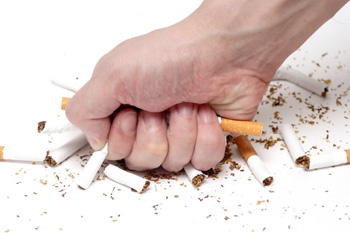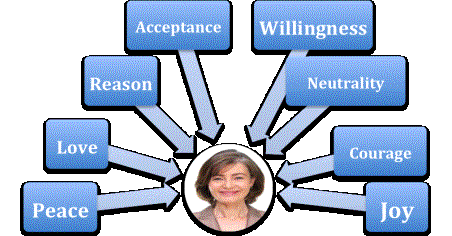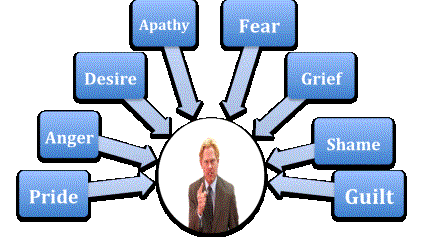|
|
|
|
| |
| You Are Here: Home > Survivorship > Wellness Plan |
|
Survivorship
In this section:
|
|
A Wellness Plan
Overview
Cancer treatments in the United States tend to focus on the disease. Yet it is well documented that cancer develops in and affects the whole person.
“Cancer is no simple disease, and effective treatment is not just about killing rogue cells with radiation and chemotherapy.”
- “Cancer Care for the Whole Patient: Meeting Psychosocial Health Needs” by
The National Academies’ Institute of Medicine, October 2007
This section will discuss the whole person, which includes the following aspects of the self:
- Physical
- Mental and Emotional
- Spiritual
Cancer and the Whole Person
Optimizing wellness in the physical body requires attention to more than the disease site. Health occurs in the context of each individual’s physical body, as well as his or her
mental, emotional, and spiritual being.
The whole person is also associated within the context of home , work, relationships with family and friends, larger community, religion or spiritual practice, activities, and any other components of his or her life.
|
|
|
|
| |
| |
 |
Some survivors might like to make major life changes they have identified through their cancer experience.
The experience of facing a serious, possibly life-threatening disease sometimes provides the motivation people need to make changes they have previously dreamed of.
|
|
| |
Everyone is unique. You may not feel a need to change anything.
Maybe you are just beginning this conversation with yourself or perhaps you have already started to achieve greater wellness.
Steps toward greater wellness
After dealing with cancer and its treatments, many survivors want to take proactive steps to improve their health, improve the quality and meaningfulness of their lives, and potentially reduce the risk of recurrence.
Research indicates there are many steps you can take to improve and maintain your vitality. Taking proactive steps toward your wellness also allows you to focus on areas of your life that you can control after cancer. For some people this is very important; for others, not. The most important measure is how you feel.
Physical
These strategies impact the physical body, as well as the mental, emotional, and spiritual:
- Eat Healthy
- Begin or Increase Exercise
- Quit or Reduce Alcohol Consumption
- Quit Smoking
For information about other wellness strategies affecting the physical body, please visit the CISN Cancer 101 Prevention section. |
| |
 |
Eat Healthy
The food we eat is one of the most significant influences in the promotion and maintenance of health. Much of the American diet is unhealthy with too much fat, meat, dairy and bread.
Studies show that many foods contain protective substances that help guard against cancer.
Most research indicates the following cancer diet guidelines for persons wanting to reduce your risk of disease or help treat the disease.
|
|
| |
What to increase in your diet:
- Vegetables, especially leafy greens and other colorful veggie treats, also lots of raw salads.
- Fruits, (Note: Some experts recommend against fruits for cancer patients due to natural sugar content and sugar's impact on disease co-factors (talk to your doctor about this))
- Fiber, including whole grains, beans, and nuts
- Fish without high levels of heavy metals such as mercury (or fish oil supplements)
- Eggs (be sure to check with your doctor if you have high cholesterol)
- Healthy oils like olive oil
- Garlic, onions, herbs, and spices such as turmeric
What to decrease in your diet:
- Animal meat and especially barbecued red meat
- Dairy products (except non-fat or low-fat 1%)
- Refined grains and things made with white flour (i.e. cookies, cakes, bread, etc.)
- Unhealthy fats (saturated) or transfats (hydrogenated oils)
- Salt and meats cured in salt
- Smoked foods
Studies recommend avoiding frying, barbequing, and microwaving due to increased cancer risk from those types of food preparation.
Always thoroughly wash your food to remove any surface pesticides and/or contaminants. Try to eat as many organic foods as possible!
CISN Tip:
Keep a journal and write down how you feel after each meal. Over a short period of time, this practice will reveal trends about what boosts versus lowers your vitality.
Go to the National Foundation for Cancer Research (www.NFCR.org) to learn more about food ingredients that help fight cancer.
Increase Exercise
Moving the body by exercising offers many health benefits against cancer. Exercise also reduces and controls obesity that may be linked with a number of cancers.
Is there evidence that exercise reduces cancer?
Some research studies indicate that exercise reduces cancer risk and offers health benefits against the disease in those that already have it. Some studies are inconclusive or show no benefit. All studies show that exercise improves your overall health.
What are the current physical activity recommendations?
“Adults should engage in moderate-intensity physical activities such as brisk walking for at least 30 minutes on 5 or more days of the week.” -Centers for Disease Control and Prevention/American College of Sports Medicine.
OR
“Adults should engage in vigorous-intensity physical activities such as jogging 3 or more days of the week for 20 or more minutes per occasion. -Health People 2010
|
| |
 |
Losing weight and exercising can help reduce your risk.
Exercise at least 30 minutes a day, most days of the week. Exercise alone can decrease the risk of colon cancer and breast cancer.
The goal should be for adults’ age 20 or older to keep their Body Mass Index (BMI) below 25. |
|
| |
The BMI is a ratio of height to weight that enables you to determine if you are the correct weight for your height. Adult BMI Calculator provided by, the Centers for Disease Control and Prevention.
Quit or Reduce Alcohol Consumption
Having more than two drinks each day for many years may increase the chance of developing cancers of the mouth, throat, esophagus, larynx, liver, and breast.
The risk increases with the amount of alcohol a person drinks. For most of these cancers, the risk is higher for a drinker who also uses tobacco
Doctors advise people who drink to do so in moderation. Drinking in moderation means:
- No more than one drink per day for women
- No more than two drinks per day for men.
Quit Smoking
According to the American Cancer Society, smoking damages nearly every organ in the human body, is linked to many cancers, and accounts for at least 30 percent of all cancer deaths.
|
| |
 |
Tobacco costs billions of dollars each year. Estimates indicate one in five Americans still smokes. Quit the habit, and stay away from secondhand smoke! |
|
| |
There are many resources to help people stop using tobacco:
- Staff at the National Cancer Institute (NCI) Smoking Quitline (1-877-44U-QUIT) and at LiveHelp (click on "Need Help?" at: http://www.cancer.gov) can talk with you about ways to quit smoking and about groups that help smokers who want to quit. Groups may offer counseling in person or by telephone.
- A Federal Government Web site, http://www.smokefree.gov, has an online guide to quitting smoking and a list of other resources.
- Doctors and dentists can help their patients find local programs or trained professionals who help people stop using tobacco.
- Doctors and dentists can suggest medicine or nicotine replacement therapy, such as a patch, gum, lozenge, nasal spray, or inhaler.
Mental and Emotional
Self-Exploration
Because of the intensity of the cancer experience, in which it seems as if their world is turned upside down, some survivors have experienced varying degrees of confusion about themselves and their lives after the cancer diagnosis.
For some, cancer raises the question, "Who am I?" Other people just want to finish their treatment and continue on with their life.
If you are interested in self-exploration, a helpful resource is Cancer as a Turning Point by Lawrence LeShan, PhD.
This book discusses how moving toward a love for life mobilizes the immune system, promotes wellness and may trigger healing. Beyond scientific research into how molecules interact in the biological systems, LeShan emphasizes human action.
He also challenges people to search for a lifestyle especially suited for them, and when found, actively work toward living this life. |
| |
 |
This may require re-examining how you view yourself by moving from:
What others want/expect of you, to what you want or would enjoy doing. |
|
| |
"Our actions are usually based on these 'shoulds' rather than on the question of 'what would fulfill me - what style of being, relating, creating would bring me to a life of zest/ love? ' What kind of life would they be living if they adjusted the world to themselves instead of -- as our (cancer) patients generally have done -- adjusted themselves to the world'?"
- All quotes are from Cancer as a Turning Point by Lawrence LeShan, PhD.
Body/Mind Connection
Research has demonstrated the interconnection between the body and mind. Our mental and emotional states influence physical health.
This does not mean that your thoughts and feelings created your cancer. It was not your fault.
It simply means that you may wish to pay greater attention to the relationship between your physical, mental, and emotional self. |
| |
 |
One step in this direction is to be more aware of how you think and feel daily:
- What are your thoughts when you wake up in the morning?
- How do you think and feel throughout the day?
- What are your thoughts before you go to bed at night?
Sometimes it is surprising how much time human beings spend in destructive mental and emotional states. Honoring your feelings is important, but getting stuck in “negative” places can impact one’s health.
|
|
| |
The following emotions may impact your life for better or worse
The mind/body connection is like all other aspects of disease and life -- very individual.
We all know people who live as if the glass is " half empty " and others who live as if the glass is "half-full". You may want to reexamine how you approach life.
Emotions That Promote Wellness

Emotions That Detract From Wellness

Please remember, we are not doctors and are not making recommendations. Always discuss your concerns and choices with a trained professional.
Below is a list of options.
CISN Tips:
- Keep a journal about where you are in your life and what you feel
- Sit quietly. Meditation helps people gain clarity about your thoughts, emotions, and more
- Ask yourself how you really want to spend your time and ask often to see what stays the same and what changes
- Determine what you love, and surround yourself with those people, activities, places, and/or whatever else comes to your mind and heart
- Identify what you are grateful for and consider gratitude a regular practice
- Determine what it means for you to be more authentic in your expression, relationships, work, and other parts of your life
- Consider talking with a mental health professional to help you explore your feelings, beliefs, and perspectives
- Ponder whether or not you might benefit from a support group
Spiritual
Some people affected by cancer report relying on spiritual and/or religious beliefs and practices to help them cope with their disease.
Religious Versus Spirituality
For many people, spirituality and religion have different meanings.
- Religion may be defined as a specific set of beliefs and practices, usually associated with an organized group.
- Spirituality may be defined as an individual's sense of peace, purpose, connection to others, and beliefs about the meaning of life. Spirituality may be found and expressed through an organized religion or in other ways.
Spiritual well-being
Spiritual and religious well-being may be associated with improved quality of life. It is not known for sure how spirituality is related to health.
Some research indicates that spiritual or religious beliefs and practices promote a positive mental attitude and may help a patient feel better.
|
| |
 |
Spiritual and religious well-being may be associated with improved quality of life in the following ways:
- Reduced anxiety , depression , and discomfort
- Reduced sense of isolation (feeling alone)
- Better adjustment to the effects of cancer and its treatment
- Increased ability to enjoy life during cancer treatment
- A feeling of personal growth as a result of living with cancer
- Improved health outcomes
|
|
| |
Spiritual Distress
Spiritual distress is unresolved religious or spiritual conflict and doubt. This distress may contribute to poorer health outcomes.
A serious illness like cancer may challenge a person’s beliefs or religious values. This may result in spiritual distress.
Some cancer patients may feel that cancer is a punishment by God or may suffer a loss of faith after being diagnosed. Some wonder if their prayers are being answered.
CISN Tip:
You may want to have an in-depth discussion with a spiritual leader who has helped you in the past. If this person is not helping, it may be time to consider exploring the spiritual guidance and support of someone else.
Also for those individuals undergoing spiritual distress, we recommend doing a spiritual self-assessment.
|
| |
 |
You may wish to reflect upon and define your own religious and/or spiritual beliefs in the midst of cancer. A strong understanding of one's beliefs provides clarity and support, especially during challenging times.
|
|
| |
A spiritual assessment may include questions involving the following issues:
- Religious denomination, if any
- Beliefs or philosophy of life
- Important spiritual practices or rituals
- Use of spirituality or religion as a source of strength
- Participation in a religious community
- Use of prayer or meditation
- Loss of faith
- Conflicts between spiritual or religious beliefs and cancer treatments
- Ways that caregivers may address their patient's spiritual needs
- Concerns about death and the afterlife
- End-of-life planning
|
| |
|
|
| |
|
|
|
| |
|
|
| |
| Copyright © 2006-2013 CISN - All Rights Reserved. |
| |
| Site Design by: Studio457 |
| |
|













